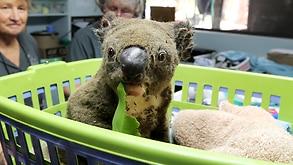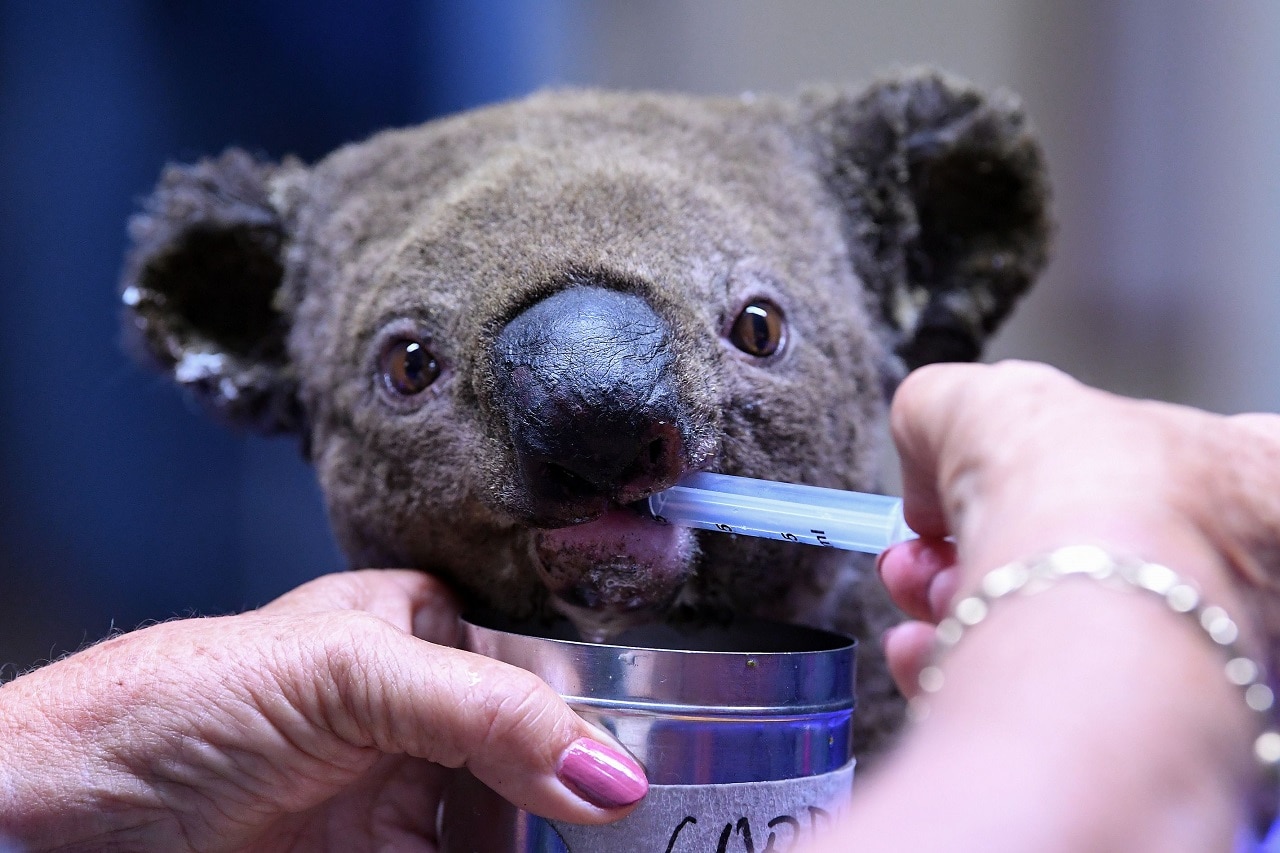SBS News, 9 December 2019:
 |
Paul the koala in the ICU recovering from burns at The Port Macquarie Koala Hospital on November 29, 2019. Source: Getty
|
NSW parliament's upper house will hold an urgent hearing on the extent of damage to the koala population from the recent bushfires, with 2,000 feared dead.
An inquiry into koala populations and habitat in NSW is expected to hear evidence that more than 2,000 of the native Australian marsupial may have died on the state's north coast in recent bushfires.
The state parliament's upper house inquiry will hold an urgent hearing on Monday to discuss the extent of damage to the koala population from bushfires.
Thousands of hectares of koala habitat across northern NSW and southeast Queensland have been destroyed in the recent bushfires.
Koalas are listed as vulnerable in Queensland, NSW and the ACT, largely a result of habitat clearing......
 |
A dehydrated and injured Koala receives treatment at the Port Macquarie Koala Hospital. Source Getty
|
North East Forest Alliance president and ecologist Dailan Pugh is expected to give evidence on Monday that more than 2,000 koalas may have died and up to one-third of koala habitat on the state's north coast may have been lost in the fires.....
Port Macquarie Koala Hospital's clinical director Cheyne Flanagan and Indigenous fire practitioners are also due to give evidence, as well as representatives of the National Parks and Wildlife Service and the NSW Department of Planning, Industry and Environment....
The Guardian, 9 December 2019:
 |
| Photograph: Supplied by Jimboomba Police |
Mark Graham, an ecologist with the Nature Conservation Council, told the inquiry that koalas in most instances “really have no capacity to move fast enough to get away” from fast-moving crown fires that spread from treetop to treetop.
“The fires have burned so hot and so fast that there has been significant mortality of animals in the trees, but there is such a big area now that is still on fire and still burning that we will probably never find the bodies,” Graham said.
The crown fires which have torn through broad expanses of NSW north coast forest, a known biodiversity hotspot, were unprecedented.
“We’ve lost such a massive swath of known koala habitat that I think we can say without any doubt there will be ongoing declines in koala populations from this point forward,” Graham said.
Science for Wildlife executive director Dr Kellie Leigh told the hearing there was no resources or planning in place to save koala populations in the Blue Mountains from fires currently threatening the region.
“We’re getting a lot of lessons out of this and it’s just showing how unprepared we are,” Dr Leigh said on Monday.
“There’s no procedures or protocols in place ... even wildlife carers don’t have protocols for when they can go in after fire.”
The Blue Mountains fires have already hit two-thirds of the northern population the organisation has studied and one-third of the Kanangra-Boyd National Park population, Dr Leigh said......
Echo NetDaily, 9 December 2019:
Prior to the current bushfires koalas were at risk of major population decline through habitat loss and logging but with significant areas of their habitat being burnt out by bushfire many of the previously stable colonies are on the verge of collapse. Recognising the disastrous impact that the fires are having on koala populations a call is being put out to the NSW government to stop logging of koala habitat.
A number of groups appearing before today’s NSW Legislative Council inquiry into koala populations and habitat in New South Wales have requested the committee actively call on the NSW government to put in place a moratorium on logging koala habitat across public and private lands as an emergency response to the loss of thousands of koalas and their habitat due to wildfires....









No comments:
Post a Comment